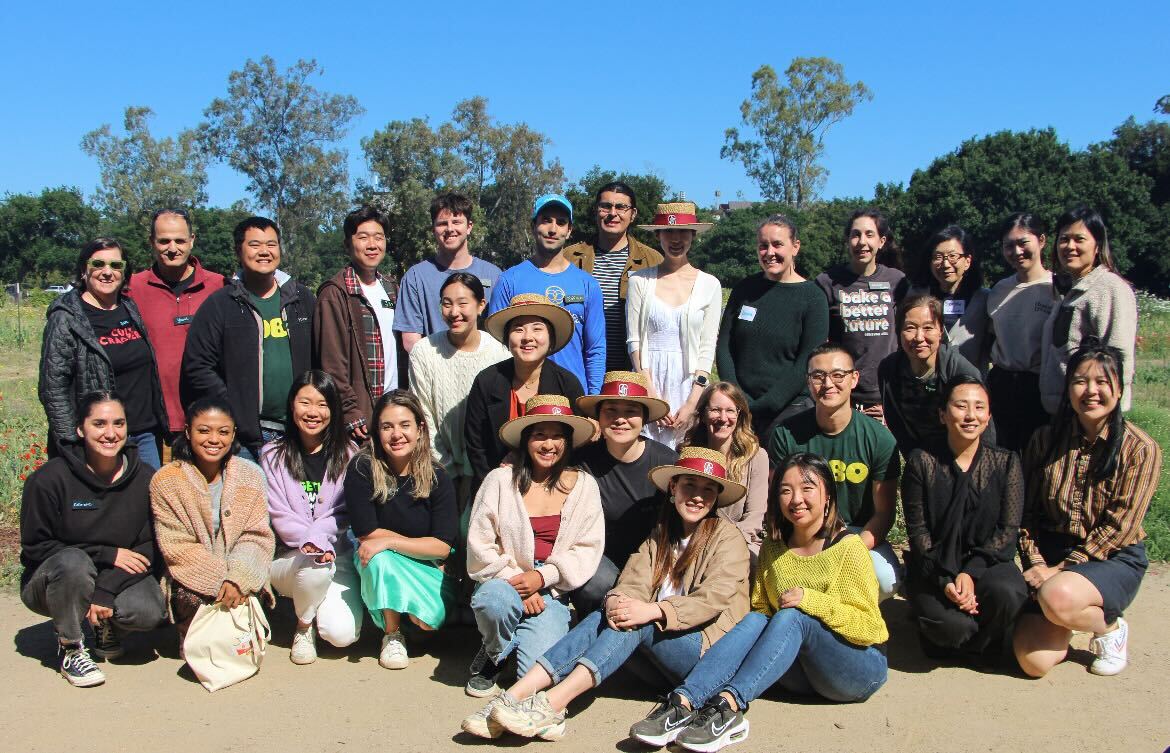The Stanford Food Design Lab hosted their annual Food Innovation conference on Friday, bringing together pioneers from the sustainable food industry and showcasing an array of plant-based delicacies, from mushroom jerky to an assortment of cross-culturally flavored vegan cookies.
The theme for this year’s day-long conference was consumer packaged goods (CPG), with an overarching theme of human-centered food design. According to event organizer Mika Isayama ’22, research in food values and online food reviews by Summer Jung, a Ph.D. student in the lab, served as inspiration for this year’s theme. The conference featured sampling tables from a variety of food startups as well as a series of interactive workshops and networking sessions.
Twelve CPG companies were invited to showcase their products at the conference. Notable CPG companies included Three Trees (almond milk), munchrooms (mushroom jerky), Final Foods (plant-based gourmet meat), 12 Tides (kelp chips), and Sobo Foods (plant-based Asian dumplings).
The Food Innovation Conference originated at UC Berkeley in 2016 and began at Stanford in 2016 when Dr. Soh Kim — who previously worked for the FoodInno Institute at UC Berkeley — began their role as Executive Director of Food Design Research under Design X at Stanford Mechanical Engineering. According to Kim, the conference was established at Stanford to bridge the strengths of the two schools.
Over a hundred attendees walked amongst booths on The Farm during the conference’s designated sampling session. According to Katie Yoon ’23 M.S. ’24, a graduate researcher at Stanford Food Design Lab, initial recruitment for sampling participants resulted in an “overwhelming response” of nearly 150 RSVPs, exceeding the available capacity for the space.
Most of the conference attendees were students enrolled in the class ‘Food, Design and Sustainability,’ which required its students to attend the conference. Conference attendance outside of the class was limited this year to allow the lab to create a “controlled experiment.” Additionally, the venue used for the conference had limited capacity, and there were limited samples available, Yoon wrote in an email to The Daily.
Hillary Tran ’24 was one of just thirty participants who made the final cut. According to Tran, the variety of delicious flavors available for sampling made Ounce Cookies her favorite vendor.
“The conference’s atmosphere was a pleasant surprise for me,” Tran said, adding that she “didn’t know what to expect coming in” but found the conference to be “really welcoming and exciting.”
Gina Shi founded munchrooms, a San Francisco based mushroom jerky business, in 2020. Accompanied by stickers and small sample cups filled with mushroom sauce, the booth showcased jerky made from mushrooms. Shi said this food item was inspired by a business trip to China in 2019, where she learned of the environmental and health benefits of mushrooms.
“Growing up I loved snacking, especially anything with that junk food label. As I got older, my body couldn’t handle it anymore and I realized I needed a healthier option,” Shi said.
Izabella Smolnicka-Dos Santos ’26, a student in the ‘Food, Design and Sustainability’ class, expressed that taking the one-unit speaker series helped her prepare for the event.
“It’s given me a lot of perspective and has helped me gain the skills to ask better questions to the vendors here,” Santos said. “I like seeing the different ways companies are acting on values to make and market their products for people to enjoy.”
Santos was most impressed by Renewal Mill’s dark chocolate brownies, which are made from upcycled waste from food manufacturing.
Julian Ramirez, founder of San Mateo plant-based meat company Final Foods, said that he hopes that sampling environmentally friendly products serves as inspiration for the students attending. At the event, Final Foods handed out their plant-based boneless baby back ribs. The ribs are made in their factory with extrusion — a type of cooking that uses high-pressure heat to turn flour into a meat-texture-like product — and free of antibiotics and hormones.
“I think students should take away that your passions can become a reality, and they can align with your values too. You can definitely pursue food if that’s your passion and you can do it in a very informed and conscious way,” said Ramirez.
This article has been updated to include the name of the Ph.D. student who inspired the theme for this year’s Food Innovation conference.
